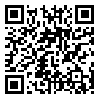Volume 2, Issue 1 And Supplement (Winter 2021)
J Vessel Circ 2021, 2(1 And Supplement): 9-9 |
Back to browse issues page
Download citation:
BibTeX | RIS | EndNote | Medlars | ProCite | Reference Manager | RefWorks
Send citation to:



BibTeX | RIS | EndNote | Medlars | ProCite | Reference Manager | RefWorks
Send citation to:
Golmoradizade A. The Relationship between Non-linguistic Cognitive Deficits and Language Recovery in Patients with Aphasia. J Vessel Circ 2021; 2 (1) :9-9
URL: http://jvessels.muq.ac.ir/article-1-85-en.html
URL: http://jvessels.muq.ac.ir/article-1-85-en.html
Speech and Language Pathologist, Tehran University of Medical Sciences, Tehran, Iran
Abstract: (790 Views)
Background and Aim: Non-linguistic cognitive impairments may limit rehabilitation efficacy in patients with aphasia. The aim of this study was to determine whether post-stroke aphasia was associated with impairments of visuo-spatial working memory and abstract thinking and whether these deficits adversely affected language recovery.
Materials and Methods: This review article is about The relationship between non-linguistic cognitive deficits and language recovery in patients with aphasia
were extracted from Science Direct, Pro quest and Pub med Data Bases. 15 articles had been selected according to inclusion criteria from 2012 to 2019 and 5 of them had been deleted by exclusion criteria.
Results: Even though the patientschr('39') non-linguistic cognitive abilities were impaired in general, the patients were heterogeneous with regard to their deficits. Linguistic and non-linguistic deficits appeared to be distinct, although they could be concurrent. Visuo-spatial working memory was associated with the degree of improvement in two functions crucial to language communication: naming and comprehension.
Conclusion: This pilot randomized controlled trial showed No relationship was found between language therapy outcome and abstract thinking ability.
Materials and Methods: This review article is about The relationship between non-linguistic cognitive deficits and language recovery in patients with aphasia
were extracted from Science Direct, Pro quest and Pub med Data Bases. 15 articles had been selected according to inclusion criteria from 2012 to 2019 and 5 of them had been deleted by exclusion criteria.
Results: Even though the patientschr('39') non-linguistic cognitive abilities were impaired in general, the patients were heterogeneous with regard to their deficits. Linguistic and non-linguistic deficits appeared to be distinct, although they could be concurrent. Visuo-spatial working memory was associated with the degree of improvement in two functions crucial to language communication: naming and comprehension.
Conclusion: This pilot randomized controlled trial showed No relationship was found between language therapy outcome and abstract thinking ability.
Type of Study: Review |
Subject:
stroke
Received: 2021/06/21 | Accepted: 2021/02/28 | Published: 2021/02/28
Received: 2021/06/21 | Accepted: 2021/02/28 | Published: 2021/02/28
Send email to the article author
| Rights and permissions | |
 |
This work is licensed under a Creative Commons Attribution-NonCommercial 4.0 International License. |






